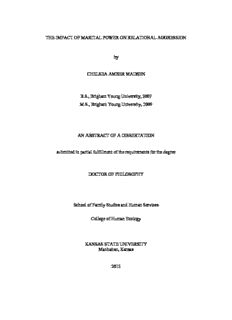
THE IMPACT OF MARITAL POWER ON RELATIONAL AGGRESSION by CHELSEA AMBER ... PDF
Preview THE IMPACT OF MARITAL POWER ON RELATIONAL AGGRESSION by CHELSEA AMBER ...
THE IMPACT OF MARITAL POWER ON RELATIONAL AGGRESSION by CHELSEA AMBER MADSEN B.S., Brigham Young University, 2007 M.S., Brigham Young University, 2009 AN ABSTRACT OF A DISSERTATION submitted in partial fulfillment of the requirements for the degree DOCTOR OF PHILOSOPHY School of Family Studies and Human Services College of Human Ecology KANSAS STATE UNIVERSITY Manhattan, Kansas 2012 Abstract Little information is available on the use of relational aggression in adult romantic relationships. In a sample of 325 married couples (650 spouses) we assessed the use of relational aggression within couples married an average of approximately 18 years to learn more about relational aggression within this population. To understand a potential motivating factor for the use of relational aggression, marital power was also examined. Finally, to learn whether or not relationship satisfaction mediates the relationship between marital power and relational aggression, relationship satisfaction was measured and was found to be a significant mediating variable. Using the actor/partner interdependence model, we found that those who were dissatisfied in their relationships, regardless of perceived marital power, were more likely to use relational aggression. Additionally, those who were satisfied in their marriage were less likely to use relational aggression. Wives participated in more relational aggression than husbands and husbands perceived themselves as having more power and were more satisfied in the marriage. Implications and suggestions for clinicians are offered. THE IMPACT OF MARITAL POWER ON RELATIONAL AGGRESSION by CHELSEA AMBER MADSEN B.S., Brigham Young University, 2007 M.S., Brigham Young University, 2009 A DISSERTATION submitted in partial fulfillment of the requirements for the degree DOCTOR OF PHILOSOPHY School of Family Studies and Human Services College of Human Ecology KANSAS STATE UNIVERSITY Manhattan, Kansas 2012 Approved by: Major Professor Sandra M. Stith Copyright CHELSEA AMBER MADSEN 2012 Abstract Little information is available on the use of relational aggression in adult romantic relationships. In a sample of 325 married couples (650 spouses) we assessed the use of relational aggression within couples married an average of approximately 18 years to learn more about relational aggression within this population. To understand a potential motivating factor for the use of relational aggression, marital power was also examined. Finally, to learn whether or not relationship satisfaction mediates the relationship between marital power and relational aggression, relationship satisfaction was measured and was found to be a significant mediating variable. Using the actor/partner interdependence model, we found that those who were dissatisfied in their relationships, regardless of perceived marital power, were more likely to use relational aggression. Additionally, those who were satisfied in their marriage were less likely to use relational aggression. Wives participated in more relational aggression than husbands and husbands perceived themselves as having more power and were more satisfied in the marriage. Implications and suggestions for clinicians are offered. Table of Contents List of Figures..............................................................................................................................viii List of Tables.................................................................................................................................ix Acknowledgements.........................................................................................................................x Dedication......................................................................................................................................xi Chapter 1 - Introduction..................................................................................................................1 Focus of This Study....................................................................................................................4 Theory.........................................................................................................................................6 Our Study....................................................................................................................................6 Hypotheses..................................................................................................................................7 Chapter 2 - Literature Review.........................................................................................................9 Introduction – Overview of Chapter...........................................................................................9 Aggression..............................................................................................................................9 Covert Forms of Aggression.................................................................................................10 Definition of Relational Aggression.....................................................................................11 Relational Aggression and Psychological Aggression.........................................................12 Past Research on Relational Aggression..................................................................................13 What Do We Know About Relational Aggression and What Impact Does it Have?...........13 Early Childhood....................................................................................................................14 Middle Childhood.................................................................................................................17 Continued Development of Relational Aggression with Increasing Age.............................18 Adolescents Use of Relational Aggression.......................................................................19 Emerging Adults Use of Relational Aggression...............................................................21 Gender Differences...........................................................................................................23 Romantic Relationships....................................................................................................24 Marital Power...........................................................................................................................28 Research on Marital Power...................................................................................................29 Marital Power Definition......................................................................................................30 Marital Power Models...........................................................................................................32 Gender and Power.................................................................................................................33 vi Perception of Power..............................................................................................................35 Gaining Power......................................................................................................................36 Marital Power and Intimate Partner Violence......................................................................39 Marital Satisfaction and IPV.................................................................................................42 Marital Satisfaction...................................................................................................................43 Theory.......................................................................................................................................44 Systems Theory.....................................................................................................................44 Democratic Exchange Model................................................................................................46 Hypotheses................................................................................................................................47 Chapter 3 - Methods......................................................................................................................49 Participants................................................................................................................................49 Procedure..................................................................................................................................50 Measures...................................................................................................................................52 Relational Aggression...........................................................................................................53 Marital Power........................................................................................................................54 Relationship Satisfaction......................................................................................................54 Data Analysis............................................................................................................................56 Chapter 4 - Results........................................................................................................................58 Chapter 5 - Discussion..................................................................................................................64 Implications..............................................................................................................................70 Implications for Future Research..............................................................................................70 Relevance for Marriage and Family Therapy...........................................................................75 Limitations................................................................................................................................77 Conclusion................................................................................................................................78 References.....................................................................................................................................79 Appendix A - Origins and Differences Between Types of Covert Aggression............................88 Appendix B - Informed Consent (wave 2)....................................................................................91 Appendix C - Love Withdrawal....................................................................................................94 Appendix D - Social Sabotage......................................................................................................95 Appendix E - Marital Power.........................................................................................................96 Appendix F - Relationship Satisfaction........................................................................................97 vii List of Figures Figure.1 Model of Marital Power, Marital Satisfaction and Relational Aggression....................56 Figure 2. Structural Model Estimating the Impact of Marital power and marital satisfaction on husband and wife relational aggression (Standardized Estimates shown; n = 325 couples) 60 viii List of Tables Table 1. Summary of First-Order Correlations Controlling for Husband Education Including Means and Standard Deviations (N=650)............................................................................58 ix Acknowledgements I would like to thank the many people who assisted me in completing this dissertation. Above all, I am grateful to a benevolent Father in Heaven who has provided countless tender mercies and miracles in order for me to accomplish this dissertation and my degree. I am grateful to my husband, Spencer, who has been there every step of the way with love and support. He has made great sacrifices to encourage me to follow my dreams and I will be forever grateful to him for his willingness to unwaveringly support me in this endeavor. I am grateful to my parents who have been my greatest supporters and promoters throughout my education from the beginning. My father has been my example of excellence and taught me how to grow professionally and personally. My mother has always been my greatest cheerleader, believing in me when it was difficult to do so myself. They have taught me how to be a strong woman. I would also like to thank my major professor, Sandra Stith, for sharing her vast knowledge, and her willingness to sacrifice and help me in whatever way she could. She has been a spectacular mentor, friend and example. Her support and counsel have been invaluable. Also, I am grateful for the help and suggestions that James Harper, Candyce Russell and Yvonne Amanor-Boadu provided while serving on my dissertation committee. x
Description: